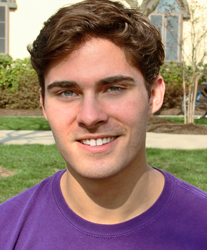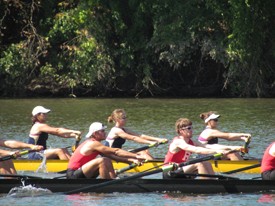“They were hugely supportive of me, thankfully,” says Angelides, a Rutgers senior who will receive his bachelor of art’s degree this month in linguistics and English from the School of Arts and Sciences.
The response from members of the Rutgers Crew team was similarly positive. Although he waited until the beginning of second semester of his first year, the news met with acceptance and tolerance from team mates.
Not every gay or lesbian teenager is as lucky, Angelides acknowledges – far from it. People perceive the world of athletics in particular as “not overly embracing,” says Angelides, now 22 and co-captain of the team.
Like many perceptions, it’s not totally accurate.
“In fact,” he says, “collegiate athletics has been, perhaps surprisingly at first, a very accepting place, despite people’s initial assumptions to the contrary.”
But while he acknowledges progress, Angelides isn’t blind to the realities many young gays and lesbians face on a daily basis.
Hearing once too often about teenagers taking their own lives after years of bullying and rejection, the Columbia, Connecticut native resolved to make the world a safer place, starting symbolically in his own backyard.
“I am openly gay, and realized I had never done anything for the LGBT community. After all the teen suicides, I felt an existential need to take action.”
He began working on behalf of Athlete Ally, a year-old nonprofit organization that encourages everyone involved in sports at the college level to respect team members no matter what their sexual orientation.
Hudson Taylor, a straight wrestler and three-time NCAA All-American from the University of Maryland, launched the nationwide initiative in January 2011. Now an assistant wrestling coach at Columbia University, Taylor crafted a two-sentence pledge that is gaining followers on campuses around the country:
“I pledge to lead my athletic community to respect and welcome all persons, regardless of their perceived or actual sexual orientation, gender identity or gender expression. Beginning right now, I will do my part to promote the best of athletics by making all players feel respected on and off the field.”
As a Rutgers Athlete Ally ambassador, and with the cooperation of Athletic Director Timothy Pernetti, Angelides has been reaching out to captains and players on all the university’s teams.
“Basically, taking the pledge obligates you to be a positive role model in words and action when it comes to issues of sexual orientation and gender identification,” says Angelides, who founded the Rutgers Triathlon team, a club sport, and served as its president during the 2010-2011 academic year.
Among the teams that have fully signed on so far are the men’s and women’s rowing teams, the men’s and women’s soccer teams, and the women’s tennis team.
Last year, Angelides presented his case before the Student Athlete Advisory Committee, which includes at least one NCAA representative from each varsity team at Rutgers, some 18 or 20 members in all.He came away with signatures from everyone there.
The rower also described Athlete Ally’s vision at a student athlete orientation last fall, and took part in a panel sponsored by the university’s Project Civility, an ongoing series of programs aimed at building community and promoting positive social interaction.
Angelides came to Rutgers for its English department, part of the School of Arts and Sciences, and quickly became entranced by the field of linguistics. While here, he has conducted research at the Center for Cognitive Sciences under the guidance of Kristen Syrett.
Next year he will begin studying for his master’s degree in linguistics at Oxford University, concentrating on neurolinguistics and eventually working toward a doctorate if all goes as planned.
He’ll go armed with the Phi Beta Kappa key he recently qualified for, as well as the determination to continue his tireless advocacy for the LGBT community.
“We’re still waiting for the first player in major-league men’s sports to come out,” Angelides says.
It’s already happened in sports such as rugby and soccer, the Rutgers senior points out. He’s also heartened by projects such as It Gets Better, which columnist Dan Savage founded in September 2010 to encourage LGBT teenagers to look beyond the torment and the tormenters to envision a more accepting world.
“If at the age of 14 I had seen some openly male football or hockey player saying everything would be fine, I would have been ecstatic, and it would have given me the courage to come out earlier,” Angelides says.




